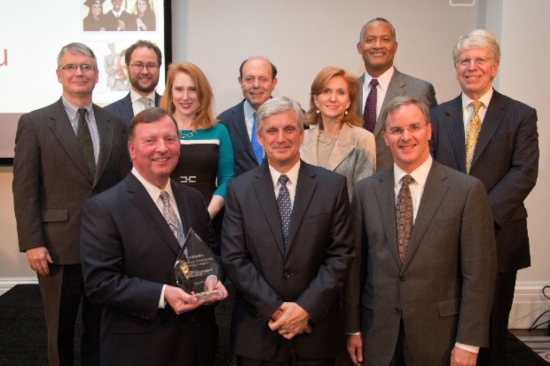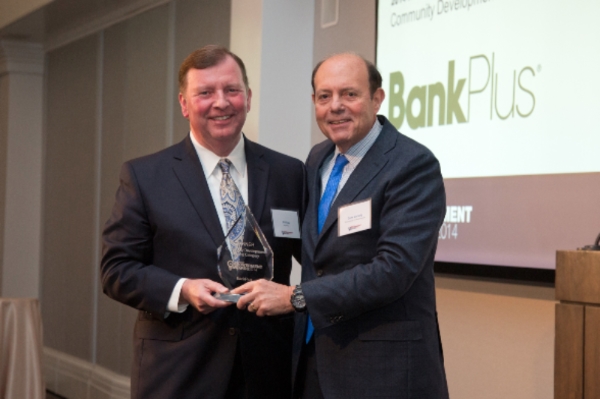Community Development Banking News
CDFI Banking: Industry, Policy, and Beyond.
The U.S. Treasury Department has announced that Annie Donovan will become the new CDFI Fund director, filling the position vacated by Donna Gambrell at the end of last year. Donovan is an experienced CDFI practitioner who most recently served as CEO of CoopMetrics, a firm that provides business intelligence tools to small businesses and nonprofits. Previously, Donovan was a senior policy advisor at the White House, working to advance impact investing with the Office of Social Innovation and the Council on Environmental Quality. Donovan has also served as the chief operating officer of Capital Impact Partners, a certified CDFI focused on education, healthcare, long term care and affordable homeownership finance.
The First, A National Banking Association has opened a new full-service banking center in Baton Rouge, LA. The First now has banks in 32 locations in Mississippi, Louisiana and Alabama. “Expansion into the Baton Rouge market is a major part of our company’s strategic plan," said The First President & CEO Hoppy Cole. "We are excited about the combination of Market President Jarrett Nicholson and our team of experienced local bankers... We believe this is an excellent entry into the Baton Rouge market and look forward to expanding our business in the Baton Rouge area.”

Promontory Financial Group has announced the winners of its first annual Empowerment Awards, a new program that recognizes promising projects that provide or encourage access to safe, fair financial services in underserved communities. Among the winners and finalists are a number of CDBA members, recognized for the innovative work CDFI Banks and Bank Holding Companies do to bring financial services to the unbanked and underbanked.
The award winners are BankPlus of Ridgeland, Mississippi and City First Enterprises, the nonprofit CDFI bank holding company of City First Bank of D.C. Both BankPlus and City First Bank of D.C. are CDBA members.
Promontory also recognized CDBA members Beneficial State Bank, Carver Federal Savings Bank and Start Community Bank as finalists in the Community Development Banking category.
Award Winners
The Access Category
Online Investment Platform

City First Enterprises is a Washington, D.C.-based CDFI nonprofit bank holding company that promotes social justice through economic-access programs and its CDFI Bank, City First Bank of D.C. City First Enterprises is developing a new online investment platform designed to link mission investors to community enterprises. The program will take advantage of crowdfunding provisions of the JOBS Act to address a severe shortfall in the financing available to CDFIs — $650 million in the past 12 months alone. Using the platform, CDFIs and their customers can access community-oriented capital, while investors have a valuable signal that their investment is directed toward community needs. The platform also will create a secondary market in community-investment notes backed by CDFI-issued loans and make smaller offerings of notes feasible through lowered administrative and transaction costs.
The Community Development Banking Category
CreditPlus

CDBA member BankPlus is an independent community bank with 65 banking offices in 34 Mississippi communities. Their CreditPlus program offers small-dollar, short-term loans at a fixed rate of 5% for up to two years. Unlike most small dollar credit products, all CreditPlus loans come with a required financial literacy course based on the...
The CDFI Fund is issuing a call for personnel to serve as application reviewers for the FY 2015 round of the CDFI Program and the Native American CDFI Assistance Program (NACA Program). The CDFI Fund requires reviewers and alternates to have considerable expertise in the community and economic development finance sectors. Prior experience serving as a successful CDFI Program or NACA Program application reviewer is preferred, but is not required. The CDFI Fund is accepting applications here on a rolling basis through Friday, December 12, 2014.
New York City residents are giving rave reviews to Spring Bank. "I've been in New York more than 30 years doing business with all the banks—Chase, Citi, all of them—and they never cared about me. But my bank now, it is a lovely bank,” said Bronx poultry salesman Hamad Ali. Spring provides real estate loans for business like Mr. Ali’s as well as a payday loan alternative called Borrow and Save. "Thousands, if not tens of thousands, of people in the Bronx alone need financial services that they just don't have access to in the banking environment," said Brian Blake, Spring Bank's vice president. "That's what we're here to do: make our customers re-examine what they've heard and learned about financial products."
Minnesota's Finance & Commerce Magazine has named Sunrise Banks Vice President of Business Development Terri Banaszewsk and University Financial Corporation President Nichol Beckstrand among the top women in Minnesota finance. University Financial Corp. hired Beckstrand as its chief operating officer in 2006. When University, Park Midway, and Franklin National banks merged in 2013 to become Sunrise Banks, Beckstrand led the team that worked to merge processes, systems, legal entities and charters. “Public accounting used to be a male-dominated industry... I want to show that [women] can make it to the C-suite and have a family and a life,” Beckstrand said.
The CFPB has proposed new rules designed to expand foreclosure protections for mortgage borrowers, building on the mortgage servicing rules that went into effect earlier this year. Chief among the new measures would be a requirement that servicers provide additional foreclosure protections to borrowers who have previously worked through the loss mitigation process and recovered. Current rules require servicers to offer borrowers certain protections, including the right to be evaluated under CFPB requirements for foreclosure avoidance options, just once during the life of the mortgage. The proposed rule would require servicers to offer those protections again to borrowers who have brought their loans current at any time since the last loss mitigation application.
Community bankers are raising concerns about President Barack Obama’s pick for Treasury Under Secretary for Domestic Finance, investment banker Antonio Weiss. Camden Fine, president of community banking trade group ICBA has expressed “serious concerns” with the nomination. Fine said he’s worried Mr. Weiss, an experienced Wall Street deal maker, doesn’t understand the needs of small and mid-size banks. The opposition adds to mounting pressure against Weiss’ nomination. Two prominent Democrats, Sen. Elizabeth Warren (D-Mass.) and Senate Majority Whip Richard Durbin (D-Ill.), have publicly said they will oppose Weiss, citing his involvement in a tax inversion deal which allowed Burger King to reincorporate abroad and cut its tax bill.
Carver Bancorp, Inc. has announced that Deborah C. Wright will retire as CEO to be replaced by Michael Pugh. Pugh, currently the company's president and COO, joined the company as chief revenue officer in 2012 and became president and COO in 2013. Wright will continue to serve as the company's non-executive chairman of the board. She will also join the Ford Foundation’s Economic Opportunity and Assets program. "I am honored to serve as Carver's CEO and I join the board in thanking Debbie for her leadership and contributions to our organization over the past 15 years,” Pugh said. “Carver has a compelling future ahead as our team concentrates on achieving our financial and operational goals and continuing a legacy of service to New York City's urban communities.”
Community Bank and Peoples Bank ranked in the SBA Mississippi District’s top five lenders by dollar volume of loans. In fiscal year 2014, a total of 412 SBA loans were approved for $153.3 million in the Mississippi district. Almost 56% of the loans backed were to underserved markets. “This could not have happened without the participation of our various lending partners,” said Janita R. Stewart, SBA Mississippi District Director. “Access to capital is the key element for small businesses to grow and prosper.” The SBA Mississippi District Office will recognize the top lenders at a special award event in the spring.
